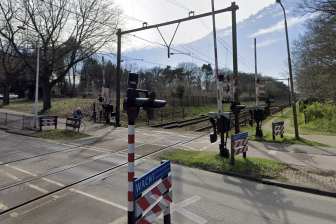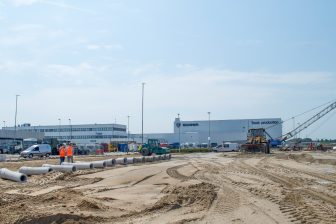90th Session of COUNCIL OF MINISTERS of transport
Paris, France – 90th Session of the COUNCIL OF MINISTERS Dublin – Ireland 17–18 May 2006 Press release – before the meeting –
- Development of the ECMT
- Sustainable Transport Policies
- Sustainable Urban Transport
- Transport and the Environment
- Road Safety
- Access and Inclusion
- Inland Waterways and Environmental Protection
- Multilateral Quota
- Research Programme
The 90th Ministerial Session of the European Conference of Ministers of Transport (ECMT)
will be held in Dublin (Ireland) on 17 and 18 May 2006.
The Session will be chaired by Mr. Martin CULLEN, the Irish Minister for Transport and
current Chairman of the Conference.
The two main topics of discussion for Ministers will be the reform of the ECMT, with the
planned creation of an International Transport Forum, and the sustainable development of transport. The second of these two topics, besides serving as a basis for a general debate on
the implementation of sustainable transport policies, should provide Ministers with an
opportunity to give their opinion on several issues presented in specific issue papers, namely:
sustainable urban transport policies, CO2 and NOx emissions in the transport sector, achieving
the target of 50% fewer deaths on the roads by 2012, and improved access to transport for all
users.
Other topics of discussion on the agenda for the Dublin Session include: inland waterways
and environmental protection, the procedure for deciding the ECMT multilateral quota for
international road haulage from 2007 onwards, and the activities of the Joint OECD/ECMT
Transport Research Centre.
The 90th Ministerial Session of the European Conference of Ministers of Transport (ECMT)(1) will be held in Dublin (Ireland) on 17 and 18 May 2006. The Session will be chaired by Mr. Martin CULLEN, the Irish Minister for Transport and
current President of the Conference. Over forty Ministers from European countries as well as Associate and Observer countries have already signalled their intention to take part in this
meeting.
There are two main items on the agenda for the Ministerial Session which should be
central to Ministers’ discussions.
1. REFORM OF THE ECMT
At the previous Council Session in May 2005 in Moscow, Ministers of Transport agreed
to transform the ECMT into a widely recognised international forum which could help promote
an understanding of the importance of transport as an essential economic factor. Ministers
felt that the ECMT should become a more global platform for the discussion of major
worldwide issues.
At the Dublin Session, the Council of Ministers will be asked to consider a draft Declaration aimed at translating this initiative into action through the creation of an International Transport Forum, whose role will be to help both policy makers and the
general public gain a deeper understanding of the essential role played by transport while
taking account of major considerations with more far-reaching implications such as the
economic, environmental and social aspects of sustainable development.
The yearly Forum should provide Ministers of Transport with the opportunity to discuss a
single topic of global strategic importance, relating to all modes of transport, with leading
figures in civil society. The founding members of the new International Transport Forum
would probably initially consist of ECMT Member countries and non-European OECD
Member countries. It is subsequently planned to open up participation in the Forum to other
countries to make this event an essential annual international meeting for key actors in the
transport sector.
2. SUSTAINABLE TRANSPORT POLICIES
The first objective under this item on the agenda is a general discussion on the implementation of sustainable transport policies. The term ‘sustainability’ has been bandied
about to such an extent that it is increasingly difficult to offer a clear and practical definition of
what it actually means. The fact that it is a composite concept drawing on areas such as the
economy, the environment and social issues, means that it lends itself to a broad
interpretation, so broad, in fact, that practically all policies claim to promote sustainable
development.
Despite widely differing national contexts, there is one striking attribute that sustainable
transport policies from different countries all have in common, namely that virtually nowhere
has the implementation of measures aimed at meeting the aspirations that have guided
transport policy with regard to many aspects of “sustainability” lived up to expectations.
Accordingly, Ministers will be invited to draw on their own experience to discuss the
difficulties involved in implementing sustainable transport policies and possible solutions.
Following this general discussion, Ministers will discuss several specific topics chosen for
their relevance to the theme of sustainable development. This will afford them an opportunity,
through a number of practical examples, to specify what type of policies in different areas
would ensure the sustainable development of transport.
2.1 Sustainable Urban Transport
Towns are home to around 80% of the world’s population and also accommodate 90% of
all economic activities worldwide. It is therefore clear that urban problems are not solely the
concern of local authorities but also of governments at the national level.
At the Council meeting in Lisbon in 2001, Ministers agreed a number of key messages
regarding the implementation of integrated sustainable urban transport policies. In Dublin,
Ministers will find in their files a report on the extent to which these key messages have
actually been acted upon not only in ECMT member countries but also in several non-
European countries. While confirming the relevance of these messages and how they should
be applied within different administrative contexts, this report reveals that countries have
been slow to act upon them due to a whole series of barriers relating, in particular, to the
policy and decision-making framework for urban travel.
The planned discussion of this subject should allow Ministers to review continuing
barriers to the implementation of sustainable urban transport policies and, by drawing on their
experience, to identify the most effective means of taking action in this respect at the level of
government. It should also provide them with an opportunity to reaffirm their commitment to
applying the key messages for governments agreed in 2001.
2.2 Transport and Environment
The environment is one of the major components of sustainability for transport policy.
Ministers will have an opportunity in Dublin to discuss policy measures aimed at reducing
CO2 and NOx emissions.
In 1995, ECMT Ministers adopted a
joint declaration with the automobile
industry on reducing CO2 emissions from new cars, and in
1997 issued a series of
recommendations aimed at stepping
up efforts to reduce emissions in the
transport sector. An overview of the
measures introduced nationally
since then has been prepared for
the meeting in Dublin. This report
shows that the most effective
measures are those which are
directly aimed at reducing the fuel
consumption of vehicles. The more
cost-effective efficiency measures
available are highlighted for priority, but the report notes that in many cases existing
programmes focus on highly costly options whose impact on CO2 emissions is fairly limited.
NOx emissions contribute to photochemical smog and ozone pollution in urban areas,
and the levels of airborne NOx are higher than they should be given the introduction of
increasingly stringent exhaust emission standards. The reasons for this situation are
analysed in a report to be presented at the Dublin meeting of the ECMT Council of Ministers.
This report suggests that the main problem lies in the approval tests to which new HGVs are
subjected. The solution is to improve the tests. Ministers will be asked to take action to
expedite the discussions currently in progress on improved testing and vehicle certification.
They will also be asked to help ensure that adequate regulatory measures are swiftly
introduced to guarantee heavy duty vehicles employing NOx emissions control systems that
rely on injection of (ammonia-based) additive can only be used when the additive injection
system is working properly.
2.3 Road safety
Sustainable transport is also safe transport.
At present, over 180 000 people are killed in
road accidents every year in ECMT Member
and Associate Member countries, i.e. one
person every three minutes. The cost of
mobility in terms of the number of lives lost is
unacceptable if transport is to be developed
on a sustainable basis. It is for this reason
that in 2002, at their Council in Bucharest,
ECMT Ministers agreed on a common goal of
reducing the number of road deaths by
50% over the period 2000-2012. Now that we
are half-way through this period, Ministers will
be presented with a report which takes stock
of the progress that has been made in achieving this objective.
Although there have been many
positive developments, it has to be
said that if current trends continue
the original objective will not be met.
In fact, there would need to be
50 000 fewer deaths on the road in
2012 alone, compared with 2004, to
meet the target. Since only six years
are left in which to meet the original
objective, exceptional efforts need to
be made, starting immediately.
Accordingly, the report presented to Ministers proposes several priority actions. This report
is based in particular on a paper entitled“ambitious road safety targets” whose findings
have been included in the file prepared for Ministers. Two OECD-ECMT Research Centre
studies on young drivers and speed management respectively will also be submitted to
Ministers as background for their discussions on this topic.
Ministers will be asked to confirm their commitment to reducing the number of road
deaths by 50% by the year 2012 and to swiftly take action in the key areas identified by the
report presented to them in Dublin.
2.4 Access and Inclusion
The Recommendations and Resolutions approved by ECMT
Ministers over the past twenty years provide a solid basis on which
to pursue the development of accessible transport systems. The
ECMT has recently updated its guide to good practices first
published in 1999. This new publication entitled “Improving transport
accessibility for all: A Guide to Good practice” will be presented to
Ministers in Dublin and should provide a basis for discussion of the
means of improving access to transport for everybody as part of the
general discussion on the sustainable development of transport.
The guide submitted to Ministers specifies priority areas for
action by governments with regard to transport accessibility.
Attention is drawn, in particular, to the efficient introduction of
specific door-to-door transport services, the potential role of
taxis and the training of transport company personnel,
especially drivers. Ministers will also find in their file a joint
ECMT-UITP publication specially issued for this meeting
entitled “Improving Access to Public Transport: Guidelines for
the employees of transport companies”.
At the end of the discussion of this item on the agenda, Ministers will be asked to restate
their commitment to implementing decisions by ECMT Ministers on improving access to
transport and to approve the policy signals from the guide to good practices and in particular
the areas that are priorities for government action.
3. OTHER ISSUES
Among the other issues that Ministers will be asked to examine in order to make a formal
decision without discussion, mention should be made of the following.
3.1 Inland Waterways and Environmental Protection
Inland waterways can contribute to making transport more sustainable, particularly when
they substitute for road transport. However, the development of waterways can have
substantial impacts on the environment.
To help ensure that the environmental impacts of inland waterway improvement works are assessed and managed properly and avoid the risk that infrastructure projects in
this sector are blocked when planning and consultation procedures break down, the ECMT
with support from the Dutch government undertook a series of case studies of best practice
across Europe. The final report will be presented to Ministers in Dublin.
The basic conclusion is that the speed and success of the decision-making process is
crucially dependent on the way in which the public, environmental actors and the industry
stakeholders concerned are involved in the project. Things go wrong when there is too little
consultation too late in the planning process. An optimal framework for strategic planning
should comprise a strategic environmental assessment incorporating multimodal corridor
assessment as well as encompassing other uses of the waterway (hydropower generation,
flood protection, irrigation, industrial and drinking water abstraction and discharge of
wastewater). Strategic planning for development of waterways would benefit from a focus on
the river basin level, to match the framework developed for the environmental protection of
water bodies. In terms of priority action, the report stresses the need to rapidly develop a
strategic vision for the protection and development of the Danube, since that is where most of
the inland waterway development projects posing as yet unresolved environmental problems
are to be found.
At the Dublin Session, Ministers will be asked to endorse the report and to approve the
actions it recommends, notably the launching of a structured dialogue between stakeholders
to prepare a consensus statement on development of inland navigation and protection of the
Danube.
3.2 Multilateral quota
At the last Ministerial Session in Moscow in May 2005, Ministers
decided to reform the ECMT multilateral quota system. To this
end they approved the criteria and methodology proposed for
ECMT international road haulage licences in the future, and also
asked that concrete proposals be submitted to them at the Dublin
Session for the calculation of basic quotas from 2007 to 2010.
The work that has been carried out in this area has provided a
basis on which agreement has been reached on the share-out of
the basic quota between Member countries for the period
2007 to 2010. The Council of Ministers in Dublin will be asked to
formally approve this agreement.
3.3 Joint OECD/ECMT Transport Research Centre
The Joint OECD/ECMT Transport Research Centre (JTRC) was established by decisions
made by ECMT Transport Ministers and the OECD Council and first became operational on
1 January 2004. This Centre accommodates both ECMT research activities and the OECD
Road Transport Research Programme. All fifty Member Countries of the ECMT and OECD
are full members of the Centre.
The strategic lines of approach and first programme of work (2004-2006) of the JTRC
were approved by ECMT Ministers in 2004 at their Session in Ljubljana. At the Dublin
Session, the Council of Ministers will be asked to approve an assessment report on the
activities of the Centre since its creation and to adopt a new programme of work for the
period 2007-2009.
(1)The ECMT founded on 17 October 1953, brings together the Transport Ministers of 43 European countries:
Albania, Armenia, Austria, Azerbaijan, Belarus, Belgium, Bosnia-Herzegovina, Bulgaria, Croatia, the
Czech Republic, Denmark, Estonia, Finland, France, FYR Macedonia, Georgia, Germany, Greece, Hungary,
Iceland, Ireland, Italy, Latvia, Liechtenstein, Lithuania, Luxembourg, Malta, Moldova, Netherlands, Norway,
Poland, Portugal, Romania, the Russian Federation, Serbia and Montenegro, Slovakia, Slovenia, Spain, Sweden,
Switzerland, Turkey, Ukraine and the United Kingdom. There are seven Associate Member countries: Australia,
Canada, Japan, Korea, Mexico, New Zealand and the United States. Morocco has the status of Observer country.
U las zojuist één van de gratis premium artikelen
Onbeperkt lezen? Profiteer nu van de introductieaanbieding voor € 10,- per maand.
Bent u al abonnee?




